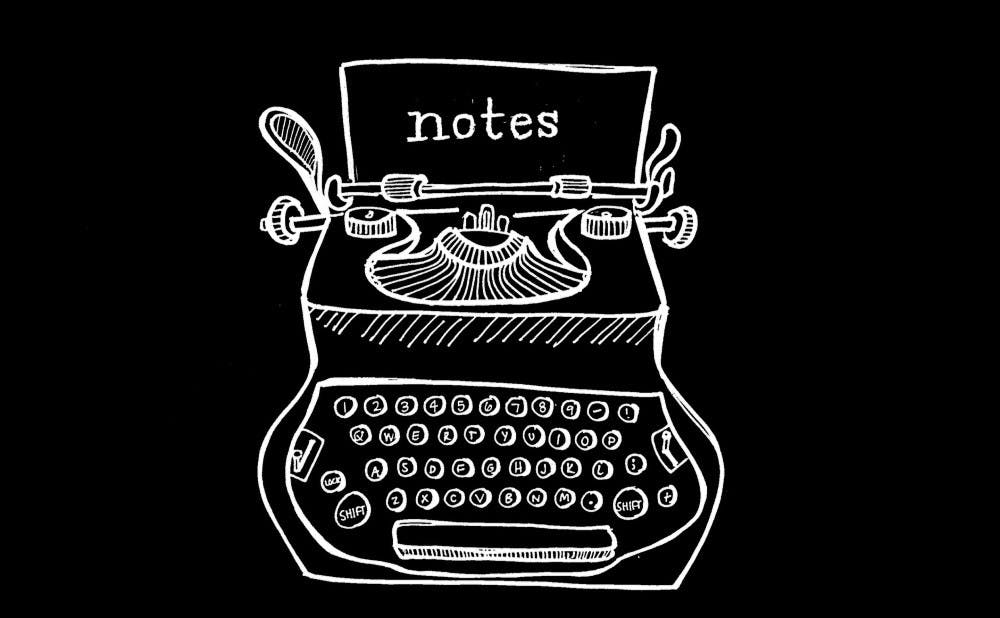I’ve had to do an egregious amount of writing in the last few weeks. Not that much writing for Recess, admittedly, but writing for classes, internships, scholarships and the like. Now, I am tasked with writing this editor’s note — in an hour and a half, optimistically — and I couldn’t be less thrilled. Truth be told, I dread writing. Maybe it comes to me more easily than most, but it could be easier. But I have to do it. I need to do it. I often find my thoughts so convoluted and disordered that I turn to writing to make them at least somewhat intelligible and to make sense of myself.
I am most insecure in my ability to communicate. I often think that if I had a more assured control of language, at least some of my social and academic fears would dissipate. I know that self-confidence is something that must be learned intrinsically — it cannot be granted from anyone. It’s funny to think that I speak three languages — English, Arabic and French — and cannot feel an ounce of self-assuredness in any one of them.
I cannot count the number of times I have hesitated to speak up in class discussion because I lacked confidence in my answer — in myself — and immediately regretted it when I realized that I was right all along. Even the times when I do answer, I find myself getting so caught up in my words, that by the end of my long-winded explanation, people are generally lost and I am nervous and flustered again.
So, I often find myself thinking about how I can remedy my insecurity. Perhaps I just need to expand my vocabulary. Surely knowing more words will allow me to convey my more complicated thoughts. Since late high school, I’ve kept a growing list of words in my phone’s notes app. I read as much as I can, play word exercises on my phone and free-write in my journal. Does it help? Well...I still haven't finished this note.
I know that I shouldn’t fault myself too much. But the people I admire most in my life seem to have such an effortless way with words. It’s as if they understand every facet of themselves, and have no trouble relaying their innermost complexities with the grace and fluidity of a dialectic gymnast. It’s hard not to feel incapable — ashamed, even, of my perceived shortcomings. And the shortcomings seem so personal, because words are so personal. They are how we reach out to the world, how we understand it through auditory and symbolic representations.
But I know that no one is infallible. I just tell myself to keep trying.
Despite my verbal hesitations, I can always rely on the page. The page is so forgiving. I can sit in front of it for hours, and the page will never betray any sign of impatience, of restlessness — no matter how frustrated or impatient I grow with myself. I can be unafraid of making mistakes upon the page, without judgement or anxiety (so long as it remains a dialogue with myself). Writing may be my own curse, but there is no blame to cast upon the imperturbable canvas.
The complications I feel when speaking are certainly also felt when writing. I typically describe my writing as frantic and disjointed. In fact, this is probably the first time I’ve attempted line-by-line writing in quite some time. Typically — especially when I write reviews — I will skip the intro altogether, jotting down my most pressing thoughts first, then slowly building my paragraphs around them. I will often jump around paragraphs — even words — as needed, and fill them in as I go along. Sometimes, I will spend upwards of five hours or more on a single article, carefully crafting my thoughts into comprehensible sentences and taking frequent breaks in between.
After I’ve exhausted my mental labor, and an article is finished, I am proud. Sure, that is to be expected, but for me it means I am capable — capable of translating the chaotic ruminations of my mind into something meaningful and thoughtful. When my work is published, my words cannot be silenced by someone louder or more assertive. People can choose whether or not they would like to read my words, but that does not make them any less present, real or valid. Writing for Recess reminds me that I have a voice. Maybe no one really cares, but at least I have said everything I needed to say at the time, and for that I am grateful.
I would like to mention that this note took me exactly an hour and a half to write, a record on my part. I am impressed by how effortlessly the words came to me after releasing the expectations that I hold for myself, emptying any presuppositions and writing what I feel instead of what I think that I should write. I can only hope that I will be this relaxed in my future writing endeavors.
Sarah Derris is a Trinity sophomore and Recess managing editor.
Get The Chronicle straight to your inbox
Sign up for our weekly newsletter. Cancel at any time.

